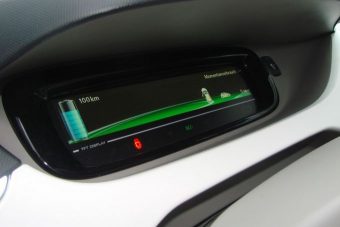
The Scottish government has today unveiled its legislative plans for the next year, featuring a major low carbon economy focus on electric vehicles, renewable energy, recycling schemes and green investment.
Among 16 proposed new pieces of legislation outlined today are plans to phase-out petrol and diesel vehicles by 2032 – eight years earlier than the 2040 ban announced by the UK government earlier this year – and to fast-track the development of a Scotland-wide electric car charging network.
The Programme for Scotland 2017/18 sets out further proposals to tackle air pollution by creating one new Low Emission Zone (LEZ) in an unnamed Scottish city by the end of the parliamentary year, increasing to a total of four LEZs across Scotland’s biggest cities by 2020.
Next year will also see Scottish outline new greenhouse gas reduction targets in its long-awaited Climate Change Bill, which will include the creation of a Just Transition Commission to advise Scottish ministers on adjusting its economy away from oil and gas to renewable technologies.
Further legislation will establish an Innovation Fund to invest £60m in battery storage, sustainable heating systems and other green technologies, as well as a commitment to provide ‘early stage support’ for a new carbon capture and storage (CCS) project in St Fergus.
The devolved administration also confirmed plans to introduce a deposit scheme to recycle cans and bottles, extend broadband coverage to all homes and businesses by 2021, invest in skills and manufacturing and to double annual investment in walking and cycling.
Meanwhile a new National Investment Bank will provide financial support for innovative industries, news that comes just weeks after the UK government sold the Edinburgh-based Green Investment Bank to Australian bank Macquarie.
Announcing the legislative programme today, First Minister Nicola Sturgeon said it was vital for Scotland to build a modern and dynamic low carbon economy in the face of “unprecedented global challenge and change”.
“We face rapid advances in technology; a moral obligation to tackle climate change; an ageing population; the impact of continued austerity and deep seated challenges of poverty and inequality; and an apparent rise in the forces of intolerance and protectionism,” she said in a statement. “These challenges are considerable, but in each of them we will find opportunity. It is our job to seize it.”
“To succeed, Scotland must lead change, not trail in its wake,” she continued. “We must aspire to be the inventor and the manufacturer of the digital, high tech and low carbon innovations that will shape the future, not just a consumer of them. To encourage others to see Scotland as the place to research, design and manufacture their innovations – for us to become a laboratory for the rest of the world in the digital and low carbon technologies we want to champion – we must also become early adopters of them. We must be bold in our ambitions.”
Campaigners hailed the programme as a “victory” for the green economy.
“The First Minister has set out an ambitious, progressive and green Programme for government, which puts Scotland’s low carbon economy in the driving seat,” Gina Hanrahan, acting head of policy at WWF Scotland said in a statement. “The benefits of today’s announcement will continue to be felt across Scotland for generations to come, as we build on the huge successes of renewable electricity, to create new jobs in clean transport and deliver a thriving economy.”
Others seized the opportunity to urge Westminster to up the ante. “The Scottish government has set a significantly more ambitious target to phase out petrol and diesel cars and vans than the one recently set by the UK government in Westminster,” Greenpeace clean air campaigner Anna Jones said. “This is what real leadership looks like […] Today’s announcement shows Nicola Sturgeon’s vision for global environmental leadership. The ball is now in Theresa May’s court.”
Source: businessgreen.com



